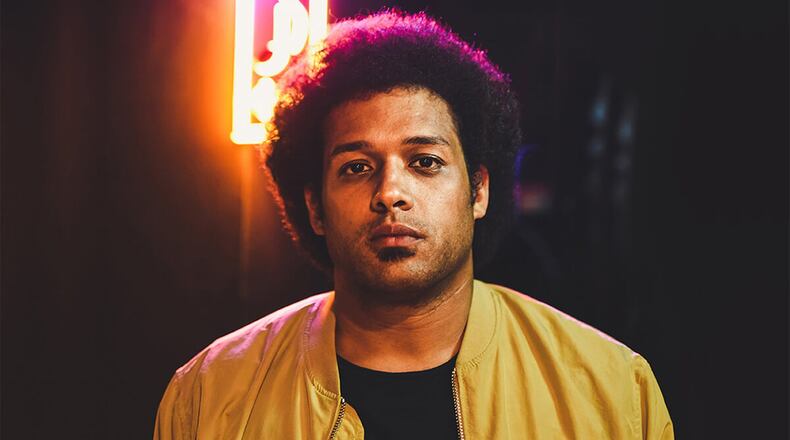As drummer Makaya McCraven plays a delicate filigree on his cymbals, harpist Brandee Younger weaves a mysterious arpeggio over a chordal vamp by Joel Ross, on vibraphone. “Holy Lands,” the second track on McCraven’s fifth album “Universal Beings,” has a slinky, hip-hop feel accentuated by a jazz vocabulary. The song turns on a hypnotic groove anchored by the drums. The musicians laid down the track as a live improvisation, and this immediacy comes across on the record. But the final version on the album was actually created in a lab.
McCraven is a jazz drummer and composer, and he has also worked diligently to become an innovative producer, collecting diverse production experiences throughout his career to inform his artistic worldview of groove-based, danceable jazz. He achieved the sound on “Universal Beings,” released last fall, by gathering together four different bands, recording a number of completely improvised shows in varying locales, and later chopping up and remixing the results in the recording studio, treating the booth as another instrument.
McCraven will perform some of those remixed tunes May 26 on the Park Drive Stage as part of the two-day Atlanta Jazz Festival in Piedmont Park. The free-admission festival boasts 27 bands and musicians performing from 12:30-10 p.m. each day across three stages. Admission is free. Yet the experience is priceless.
> Atlanta Jazz Festival lineup, times, things to know
On the first day of the festival, main stage acts include Stefon Harris + Blackout, Marcus Strickland’s “Twi-Life” and vocalist Lizz Wright. While it’s easy to park in front of a stage for the day and hear a wealth of good music, many of the best acts of the festival will perform on other stages. McCraven, trombonist Delfeayo Marsalis, pianist Christian Sands and bassist Richard Bona are all scheduled for these more intimate stages. Musicians with Atlanta connections pop up all around Piedmont Park the next day: Russell Gunn’s Royal Krunk Jazz Orkestra closes the festival after musicians like pianists Kenny Banks Jr., who recently made the finals of the American Pianists Awards, and Gary Motley perform earlier in the day.
For this weekend’s set, McCraven has assembled a band that reflects one of the album’s lineups, welcoming Younger and Ross, who will lead his own band earlier in the festival, to the stage. McCraven’s group can’t wholly recreate the “Universal Beings” aesthetic, but will instead perform arrangements transcribed from the album, as well as standards and perhaps a few additional surprises.
“One reason that I like the band to shift, and I pull from a large rotating group of musicians is because, on the records, I use a lot of textures,” said the drummer, who will be performing in Atlanta for the first time. This use of diverse musical textures goes back to his formative years, growing up the son of a jazz drummer and a Hungarian folk singer. “I like to be able to have different musicians and sounds.”
McCraven’s amalgamation of genres makes him a perfect fit for the Atlanta Jazz Festival crowd, which spends Memorial Day weekend listening to a diverse collection of music. Over the years, the festival has skewed toward more up-and-coming musicians, and the term “jazz” has become an easy shorthand for the wealth of music represented, not a strict definition. Even the headliners have distinct approaches to jazz; vocalist Wright easily moves between folksy blues, gospel, funk-leaning rock and jazz, while Harris’s band is a turbo-fueled modern jazz machine. This diversity suits McCraven just fine.
“I always like to approach the stage not orienting myself toward jazz aficionados,” he said. “My approach is always to make good music that is compelling and that people can groove with and feel that’s also kind of interesting for us to play.”
Blending elements of jazz, hip hop and R&B together to create something new is actually nearly as old as hip hop itself. Hip hop artists turned to jazz nearly immediately; likewise, the hallmarks of hip hop are embedded in jazz music itself, he said. Shying away from the label of jazz progressive, McCraven looks at himself as a traditionalist, eschewing some of the more avant-garde leanings in jazz for recurring themes, grounded vamps and rhythmic loops. He sees nothing unusual or innovative about blending hip hop and jazz.
While he’s on stage, the drummer rarely stops moving. Playing drums is undoubtedly a workout, and the effort he puts into each beat is easily apparent. At times, he becomes lost in the music. For the drummer, all of this is simply part of creating an approachable, compelling show and translating his musical vision to the audience.
“One of the most important things that you can give people out there is some heart,” he said. “I try to give it my all, and the emotions and feelings on stage sweep me up. It can be a whirlwind.”
About the Author
Keep Reading
The Latest
Featured



